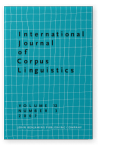Vol. 12:3 (2007) ► pp.297–333
Lexical-grammatical patterns in spoken English
The case of the progressive with future time reference
Based on a large set of data from one of the biggest available corpora of spoken British English (the 10-million word spoken component of the BNC), this article explores central lexical-grammatical aspects of progressive forms with future time reference. Among the phenomena investigated are verb preferences, adverbial co-selection, subject types, and negation. It is demonstrated that future time progressives in spoken British English are patterned to a considerable extent (for example that it is individual verbs, rather than semantic groups of verbs, that preferably occur in such constructions) and that actual language use often runs counter to claims that can be found in traditional grammatical descriptions of the construction. A number of general and often neglected issues in the analysis of lexical-grammatical patterns are also addressed, in particular the notion of pattern frequency.
Cited by
Cited by 6 other publications
This list is based on CrossRef data as of 4 july 2024. Please note that it may not be complete. Sources presented here have been supplied by the respective publishers. Any errors therein should be reported to them.
